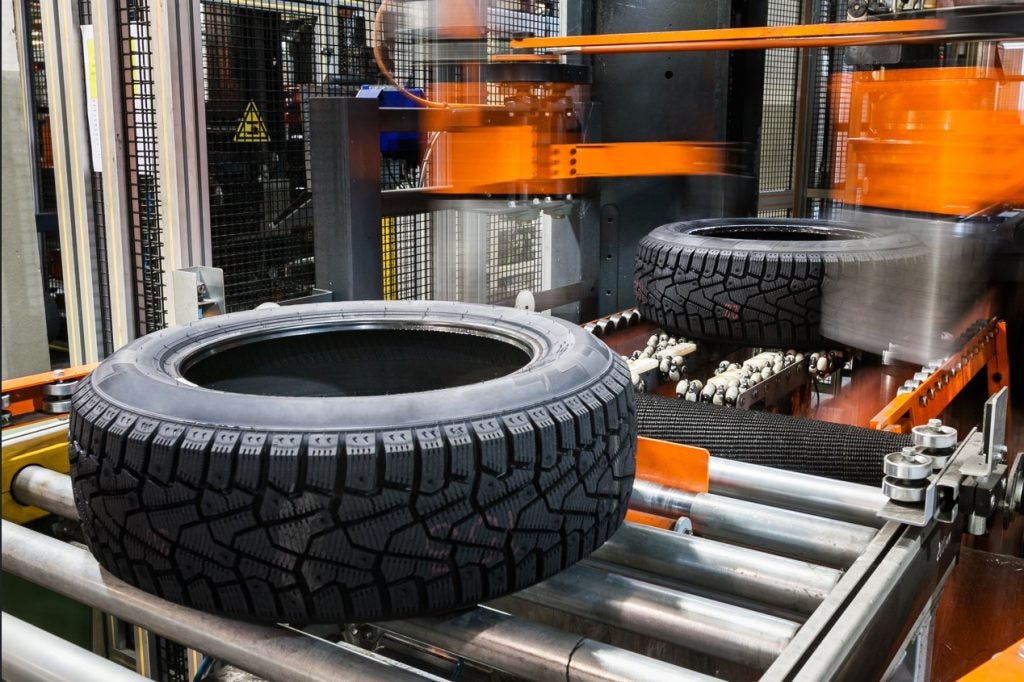
Traceability is a key area of focus for Government organisations across the world who are conscious of reducing the carbon footprint produced by the automotive industry. One sector of the industry which may be overlooked by some for its environmental impact is the tyre industry. The tyre industry is at a key moment, facing growing regulatory pressures alongside an increasing need for efficiency, traceability, and sustainability to be optimised.
The upcoming EU Deforestation Regulation (EUDR) represents a key shift for the tyre industry, demanding increased levels of supply chain due diligence. However, although the compliance deadline is fast approaching, many tyre manufacturers are far behind when it comes to implementing the necessary traceability frameworks.

Discover B2B Marketing That Performs
Combine business intelligence and editorial excellence to reach engaged professionals across 36 leading media platforms.
We spoke to Dominique Scheider, EMEA industry strategy and marketing manager for transportation, Rockwell Automation and Douglas Johnson-Poensgen, CEO of Circulor, to learn more about the upcoming EUDR regulation and why some within the industry are lagging behind.

Just Auto (JA): Could you provide some background on both companies?
Dominique Scheider (DS): Rockwell Automation is a global leader in industrial automation and digital transformation, helping manufacturers optimise operations, improve efficiency, and drive sustainable growth. Our solutions integrate advanced technologies such as manufacturing execution systems (MES) and uptime optimization with artificial intelligence (AI), to enhanced quality through traceability and digital threads, and more efficient logistics with autonomous mobile robots (AMRs).
We have a long track record of integrating our technology with SCADA (Supervisory Control and Data Acquisition) systems to enhance monitoring, control, and optimization across industrial processes in the automotive industry.
Our solutions cover the entire design, operate, and maintain lifecycle, and enable customers to keep a critical eye on sustainability, resilience, and employee empowerment.
We’ve partnered with Circulor, a leading provider of traceability and digital product-passport solutions for various industries, including the tyre industry, to combine our advanced automation offerings with Circulor’s digital traceability solutions that provide end-to-end visibility across the supply chain, helping manufacturers comply with evolving regulations such as the EU Deforestation Regulation (EUDR).
We facilitate the connection of the Circulor platform to a customer’s plant by means of advanced Internet of Things (IoT) technology.
Douglas Johnson-Poensgen (DP): Circulor offers a leading supply chain traceability solution, offering a platform that enables transparency across supply chains to prove sustainability efforts and responsible sourcing.

Established in 2017, Circulor leverages technologies like blockchain and AI, to track raw materials from their origin to final products to verify provenance, production flow, material journey, and ESG credentials. This enables companies to make data-driven decisions to reduce risks inherent in today’s supply chains; they can progress sustainable practices and support them in meeting growing regulatory obligations.
Circulor offers a comprehensive Digital Product Passport solution facilitating compliance with regulations such as the EU Battery Regulation and EU Ecodesign for Sustainable Products Regulation (ESPR), which mandate product passports in 2027.
Through our collaboration with Rockwell Automation, we are enabling manufacturers across auto, tyre, battery, metals, mining, and cement industries to address the regulatory challenges – for example the ones posed by the EUDR – while improving operational efficiency and brand reputation.
Could you discuss the upcoming EUDR and what this means for the tyre industry?
DS: The EU Deforestation Regulation (EUDR) is a major regulatory shift that will significantly impact industries dependent on raw materials sourced from deforested or degraded land, such as the automotive industry.
The EUDR mandates that companies must prove the sustainability and ethical sourcing of materials, including rubber and other raw materials commonly used in tyre manufacturing. For the tyre industry, this means implementing robust traceability systems that can track materials from their origins, such as rubber plantations, through to their use in the final product.
This regulation presents both a challenge and an opportunity: automotive manufacturers must adapt to avoid penalties, but those who act proactively will position themselves as industry leaders in sustainability.
DP: Circulor provides the technology to support tyre manufacturers in meeting the due diligence requirements of the regulation through digital tools for end-to-end traceability and data verification for each product being placed on the market.
In general, a significant number of manufacturers need to identify where they currently stand
Circulor do this by tracking the flow of physical materials throughout production stages, not the paper trail as a proxy, as they change chemical and physical state from raw to final product. With traceability enabled at every production step it creates a reliable digital chain of custody. It’s key that this is done digitally through industrial IoT applications – leaving no room for human error or manipulation and removes many of the paper-based traceability challenges.
Why are some tyre manufacturers falling behind when it comes to implementing tracing framework?
DS: Some tyre makers were ready on time to comply with EUDR before it was postponed, but indeed, others are taking longer to comply. Several factors contribute to tyre manufacturers falling behind in implementing tracing frameworks. The complexity of their global supply chains, the lack of visibility across the supply chain, the absence of standardised data, and the technological barriers of legacy systems can make traceability difficult to achieve.
In general, a significant number of manufacturers need to identify where they currently stand and what needs to be done to digitize their operations to have more insight into their production processes.
Through our digital service arm, Kalypso, we offer assessments of the digital readiness of manufacturers through which customers can create a roadmap to determine how to implement digital platforms into their existing processes and systems.
Kalypso specializes in digital transformation, leveraging advanced data science, AI, and enterprise technologies to drive innovation, optimize operations, and enable end-to-end connectivity across the industrial value chain.
As part of this approach, Kalypso will embed Circulor’s traceability solution into their suite of existing systems for tyre makers, leveraging the global agreement in place between both companies.
What more must tyre manufacturers do to make sure they adhere to regulation?
DS: Besides focusing on digitizing their operations by implementing digital solution such as Manufacturing Execution Systems (MES), digital twins, and autonomous mobile robots (AMRs) to enhance production efficiency and ensure compliance with regulatory standards, manufacturers need to keep a critical eye on their sustainability practices throughout the entire design, operation, and maintenance lifecycle. By means of smart technology, users can utilize data analytics to obtain real-time visibility of their operations to make data-driven decisions.
Cybersecurity is another important topic. To maintain compliance with regulations, manufacturers need to ensure robust cybersecurity measures are in place to protect sensitive data.
DP: Implementing traceability systems is key to complying with the EUDR and must form part of a company’s wider risk-based due diligence processes.
In addition, the ESPR requires all tyres placed on the European marketplace to have a digital product passport in 2027 to provide transparency to customers, regulators and market surveillance authorities.
Our collaboration with Rockwell Automation empowers manufacturers to meet these new regulatory requirements through tools such as the Digital Tyre Passport and provides detailed records on material sourcing and production processes. This will help manufacturers streamline their traceability systems to stay ahead of regulatory deadlines, manage supply chain risks and gain a competitive edge.
What are the business benefits of supply chain transparency?
DP: Supply chain transparency is a powerful tool for enhancing business resilience and sustainability. By tracking every step of the supply chain, companies can identify risk and inefficiencies, optimise resources, and improve product quality.
Transparency also plays a key role in regulatory compliance, helping companies meet requirements like the EUDR while mitigating the risk of penalties and reputational harm. As regulations become stricter, early adopters of transparency will gain a competitive edge.
Beyond compliance, it also enables companies to identify inefficiencies within their operations, leading to cost savings and improved production processes. The real-time data provided by digital traceability systems allows for better decision-making and risk mitigation, leading to overall operational efficiency.
Additionally, it enhances brand reputation by showing consumers that a company is committed to ethical sourcing and environmental responsibility, while consumers and stakeholders increasingly demand sustainable and ethically sourced products. By providing full visibility into their supply chains, manufacturers can differentiate themselves from competitors, strengthen their market position, and build consumer trust.
What do you see the future holding for this issue?
DS: Manufacturers are facing a plethora of uncertainties right now on a macro level and globally when it comes to supply chain sourcing and management. Ensuring production continuity will increasingly require operational agility and adaptability. That’s why the future of supply chain traceability in the tyre industry is digital, data-driven, and focused on sustainability.
At the same time, manufacturers are facing uncertainty over what type of regulations related to sustainability will be required or abandoned in the long run and how strictly they will be enforced – for example, the European Green Deal was rebranded to The Clean Industrial Deal (CID). It focuses on industrial decarbonization, supply chain transparency, and reducing carbon leakage.
Rockwell Automation helps customers accelerate industrial decarbonization and reduce CO2 footprints by offering pathways which include energy efficiency, extending asset lifespan, optimizing resources, faster response times to critical incidents, and reducing personnel in remote or sensitive locations.
Together with Circulor, we help customers integrate their existing Product Lifecycle Management (PLM) and Enterprise Resource Planning (ERP) software systems with our MES to monitor performance along energy management, Process & Power and Smart Water Management.
Manufacturers who embrace these technologies will not only stay compliant with new regulations but will also establish themselves as leaders in sustainable manufacturing, gaining a competitive advantage in a rapidly evolving market.
DP: Supply chains cannot be truly secure, reliable and resilient unless they are also sustainable and responsible.
Traceability plays an important role in supporting different types of policy goals, including on energy security, and ensuring sustainable and responsible supply chains are supported by strong due diligence processes. Therefore, the future of supply chain transparency will see even more industries embracing full digital traceability as a core business practice to drive sustainable growth and differentiation in a competitive market. As consumer demand for ethically sourced products increases and regulations become stricter, digital traceability will become the standard rather than the exception.







